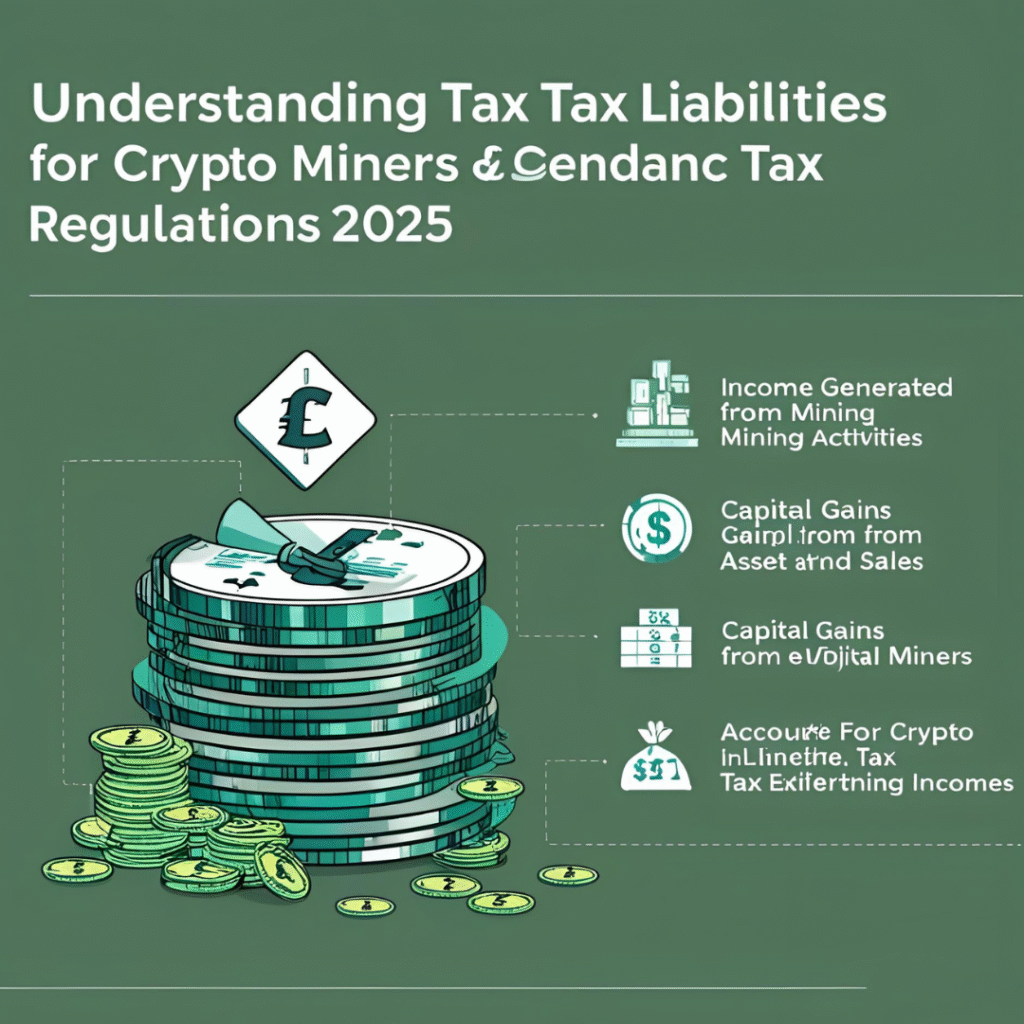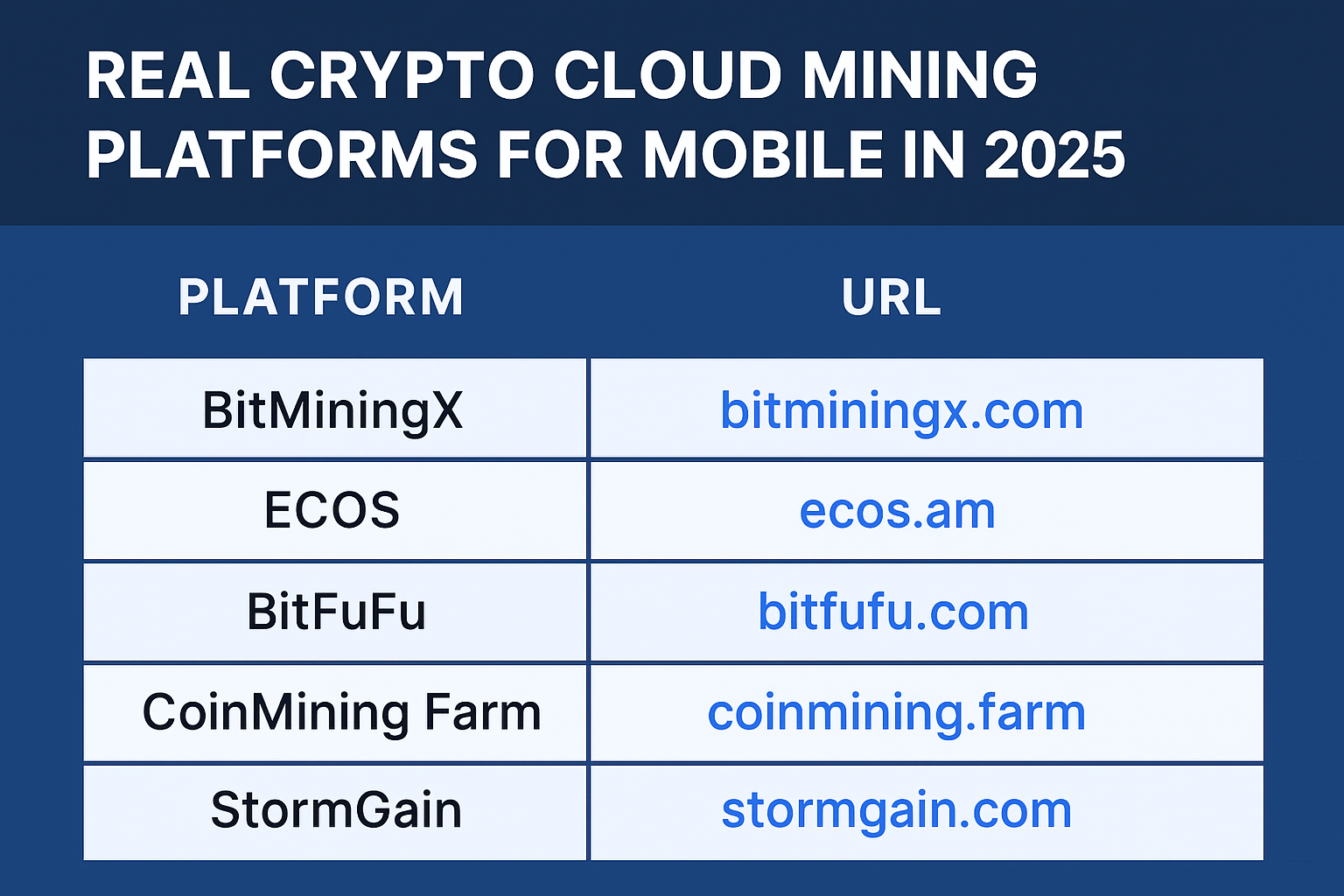As the landscape of crypto mining evolves, so too do the tax implications for miners. In 2025, understanding the classification of mining earnings as ordinary income is essential for compliance. Proper reporting and the ability to claim deductions can greatly impact profitability. However, complexities arise with capital gains tax during sales. Miners must remain vigilant to navigate these challenges and optimize their operations effectively. What strategies can they employ to stay compliant and maximize their returns?
Key Takeaways
- Crypto mining income must be reported as ordinary income at fair market value on the day it is received.
- Miners can deduct eligible expenses, including hardware, electricity, and internet costs, to reduce taxable income.
- Capital gains tax applies to profits from selling mined cryptocurrency, requiring detailed transaction records for accurate reporting.
- Staying informed about evolving tax regulations is crucial for compliance and optimizing financial outcomes for mining operations.
- Consulting a tax professional is advisable to navigate complex regulations and identify potential deductions specific to cryptocurrency mining.
Understanding Crypto Mining and Its Tax Status
In recent years, a significant number of individuals have turned to crypto mining as a means to generate income. This process involves validating transactions on blockchain networks, which in return rewards miners with cryptocurrency. Understanding crypto mining and its tax status is vital for participants in this growing industry. While mining can be lucrative, it also brings specific tax obligations that vary by jurisdiction. Earnings from mining are generally categorized as income, and miners must report this on their tax returns. Additionally, expenses related to mining operations, such as hardware and electricity, may be deductible. As the landscape evolves, staying informed about potential regulation changes is fundamental for miners to guarantee compliance and optimize their financial outcomes.
Tax Obligations for Crypto Miners in 2025
In 2025, crypto miners will face significant tax obligations that require careful attention to their tax liabilities. Understanding how to report mining income accurately will be essential for compliance with evolving regulations. As the landscape of cryptocurrency taxation continues to change, miners must stay informed to navigate these complexities effectively.

Understanding Tax Liabilities
Understanding tax liabilities is vital for crypto miners as they navigate the evolving landscape of digital currency regulations in 2025. Tax obligations for these miners are multifaceted, encompassing income generated from mining activities, capital gains from asset sales, and expenses incurred during operations. As cryptocurrency gains mainstream acceptance, governments are tightening regulations, influencing how miners report earnings and expenses. Miners must be aware of state-specific laws, as these can vary greatly and impact overall tax liabilities. Additionally, maintaining accurate records is essential to substantiate claims and deductions. By thoroughly understanding these tax implications, miners can guarantee compliance while optimizing their financial strategies in an increasingly regulated environment. Awareness and preparedness will foster a sense of community among miners facing similar challenges.
Reporting Mining Income
Accurate reporting of mining income is a critical aspect of tax obligations for crypto miners in 2025. Failing to comply with these requirements can lead to penalties and increased scrutiny from tax authorities. Miners should be aware of the following key considerations:
- Income Calculation: Determine the fair market value of mined cryptocurrency on the day it is received.
- Record Keeping: Maintain thorough records of mining activities, including expenses and equipment costs, to substantiate claims.
- Tax Filing: Report mining income as ordinary income on tax returns, ensuring proper categorization for accurate taxation.
Understanding these crypto mining tax implications helps miners navigate their responsibilities effectively, fostering a sense of belonging within the crypto community by promoting compliance and transparency.
Income Reporting: How to Report Your Mining Earnings
How should miners accurately report their earnings to comply with tax regulations? To meet the requirements set by tax authorities, miners must first determine the fair market value of the cryptocurrency at the time of mining. This value should be recorded in local currency, as it forms the basis for income reporting. Miners are required to report this income on their tax returns, typically under self-employment income. It’s essential to maintain detailed records of all mining activities, including dates, amounts mined, and the corresponding market values. By adhering to these guidelines, miners can guarantee compliance with the crypto mining tax implications, ultimately fostering a sense of belonging within the broader cryptocurrency community focused on responsible practices.

Deductions and Expenses: What Can You Claim?
What expenses can miners effectively claim to reduce their taxable income? Understanding the crypto mining tax implications can greatly benefit miners by allowing them to maximize deductions. Miners can often claim the following expenses:
- Hardware Costs: This includes the purchase of mining rigs, GPUs, and other equipment necessary for mining operations.
- Electricity Bills: The substantial energy costs incurred during the mining process can be deducted, reflecting the operational expenses involved.
- Operational Expenses: This encompasses internet costs, cooling systems, and other related overheads that support mining activities.
Navigating Capital Gains Tax on Cryptocurrency Sales
When miners decide to sell their cryptocurrency, they must carefully consider the implications of capital gains tax. This tax is applied to the profit made from selling assets, including cryptocurrencies. The difference between the sale price and the acquisition cost determines whether a gain or loss occurs. Miners should keep detailed records of their transactions to accurately calculate their taxable income. Holding periods also play an essential role; assets held for over a year may qualify for lower long-term capital gains rates. Understanding these nuances is significant for effective tax planning. As the landscape of crypto mining tax implications evolves, miners must stay informed to navigate their responsibilities effectively and guarantee compliance with tax regulations.
Impact of Regulatory Changes on Crypto Mining Taxes
The impact of regulatory changes on crypto mining taxes presents significant implications for miners. New tax regulations can introduce compliance challenges, making it essential for miners to stay informed about evolving legal frameworks. Understanding these changes is vital for effective tax planning and adherence to legal obligations in the dynamic landscape of cryptocurrency.
New Tax Regulations
As new tax regulations emerge, crypto miners must navigate an increasingly complex landscape that greatly impacts their financial obligations. The evolving framework introduces several key considerations for miners regarding crypto mining tax implications:
- Classification of Income: Miners must determine how their earnings are classified, affecting tax rates and reporting requirements.
- Deductions and Expenses: New regulations may redefine eligible deductions, requiring miners to track expenses meticulously to optimize their tax liabilities.
- Reporting Obligations: Increased scrutiny will likely lead to stricter reporting standards, compelling miners to maintain accurate records of their activities and transactions.
Understanding these factors is essential for miners to remain compliant and effectively manage their financial responsibilities in light of changing tax regulations.
Compliance Challenges Ahead
Maneuvering the evolving landscape of crypto mining tax implications presents significant compliance challenges for miners, particularly in light of recent regulatory changes. As governments worldwide implement stricter frameworks, miners must adapt to varying tax obligations that impact profitability. The complexity of tracking income generated from mining activities, coupled with fluctuating cryptocurrency values, complicates accurate reporting. Additionally, the challenge of understanding jurisdiction-specific regulations can lead to unintentional non-compliance, resulting in penalties. Miners must stay informed about ongoing legislative developments and invest in robust accounting systems to guarantee adherence. Engaging with tax professionals experienced in cryptocurrency can provide invaluable guidance, fostering a sense of community and support among miners navigating these turbulent waters.
Best Practices for Staying Compliant With Tax Authorities
Maneuvering the complexities of crypto mining tax implications requires careful attention to compliance with tax authorities. Miners can adopt several best practices to guarantee adherence to tax regulations and avoid penalties.
- Maintain Accurate Records: Detailed documentation of mining activities, expenses, and income is essential for accurate reporting.
- Consult a Tax Professional: Engaging a tax advisor familiar with crypto regulations can provide tailored guidance and mitigate risks.
- Stay Informed: Regularly updating knowledge on tax laws and regulations related to cryptocurrencies will help miners adapt to changes and maintain compliance.
Frequently Asked Questions
What Happens if I Fail to Report My Mining Income?
Failing to report mining income can lead to significant consequences. Tax authorities may impose penalties, interest on unpaid taxes, and potential legal action. Understanding obligations is essential for miners to avoid these complications and guarantee compliance.
Are There Penalties for Underreporting Crypto Mining Earnings?
Underreporting crypto mining earnings can lead to significant penalties, including fines and interest on unpaid taxes. Authorities emphasize compliance, making it essential for miners to accurately report their income to avoid financial repercussions.
Can I Carry Forward Losses From Crypto Mining?
The possibility of carrying forward losses from crypto mining is determined by specific tax regulations, which may allow miners to offset future earnings. Understanding these rules can greatly impact tax liabilities and overall financial strategy.
How Does Staking Affect My Tax Obligations?
Staking can create tax obligations as rewards received are often considered taxable income. The miner must report these earnings, impacting their overall tax liability, necessitating careful record-keeping to guarantee compliance with tax regulations.
Do I Need to Report Tokens Received as Mining Rewards?
Miners must report tokens received as rewards, as they are considered taxable income. Accurate documentation of mining activities and rewards is essential for compliance with tax regulations and to avoid potential penalties in the future.
Conclusion
To summarize, crypto miners in 2025 face intricate tax obligations that demand careful attention to detail. Understanding the classification of mining income, along with potential deductions and capital gains implications, is essential for maximizing profitability and ensuring compliance. As regulations continue to evolve, miners should prioritize maintaining accurate records and seeking professional tax advice to navigate the complexities of their operations effectively. Staying informed and proactive will be key to successful tax management in the dynamic landscape of cryptocurrency.




